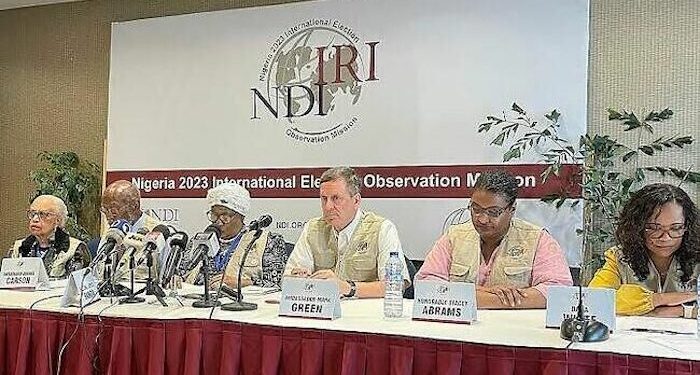The International Republican Institute (IRI), the National Democratic Institute (NDI), and the Joint Election Observation Mission (JEOM) have stated that despite the electoral reforms of 2022, the 2023 election has thus far failed to meet the expectations of the citizens.
The former president of Malawi, Dr. Joyce Banda, led the Joint Election Observation Mission, which reported that logistical difficulties and repeated incidences of political violence dominated the voting process.
Dr. Banda stated, “Despite enormous crowds at certain polling sites and lengthy lines, Nigerian voters displayed a great desire to participate in the electoral process and have their voices heard.
“We commend the Nigerian people for their perseverance and eagerness to engage in the process.”
The 40-member NDI/IRI joint IEOM was deployed in all six geopolitical zones of the nation and witnessed all phases of the voting process.
Their observations generated preliminary results and a list of twenty-seven realistic recommendations to enhance future elections.
In their remarks, the IEOM stated, “Despite the much-needed revisions to the Electoral Act 2022, the election fell far short of the realistic expectations of Nigerian citizens.”
“Logistical difficulties and several incidences of political violence clouded the electoral process and hindered the participation of a considerable number of voters.
“Persistent money and fuel shortages imposed unnecessary difficulties on voters and election authorities, and Nigerian marginalized groups, particularly women, continue to encounter obstacles in their pursuit of political office.”
In addition, the delegation noted that the late opening of voting places and logistical problems contributed to tensions, and that the confidentiality of the ballot was compromised in some polling units due to overcrowding.
“After the polls closed, problems with the electronic transmission of results and their prompt posting to a public portal eroded residents’ faith at a vital stage in the process.
“Furthermore, inadequate communication and lack of transparency by the Independent National Electoral Commission (INEC) about their cause and extent contributed to voter uncertainty and reduced their confidence in the process,” the IEOM concluded.
It stated that the cumulative effect of these shortcomings disenfranchised Nigerian voters in numerous regions, although the scope and size are unknown at this time.
“Despite these challenges, Nigerians once more shown their dedication to the democratic process.
INEC administered a countrywide election in accordance with the electoral schedule for the first time in the country’s recent history, they stated.
In addition, they urge political players and their followers to maintain calm and restraint as the nation awaits the results of the February 25 elections and the Nigerian people prepare for impending gubernatorial elections.
The mission urged INEC, the government, political actors, and civil society to redouble their efforts to meet the aspirations of citizens for transparent and inclusive elections, and to guarantee that electoral outcomes are a credible representation of voter will.
The groups acknowledged their gratitude for the cooperation and kindness they received from every Nigerians they met.
“IRI and NDI will continue to monitor the next stages of the electoral process, including the announcement of official results and the inauguration of newly-elected authorities.
They underlined that the delegation’s effort was made possible by the support of USAID.


